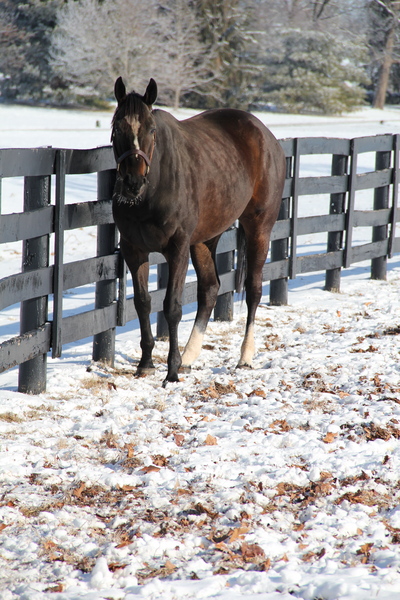By Samantha Clark
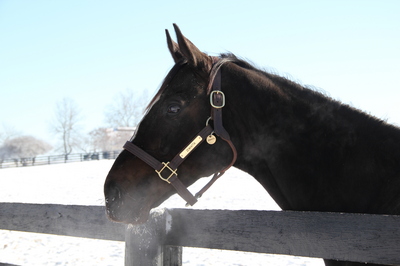
David Ingordo is definitely what you would call a "mover and a shaker" in the bloodstock business. Still in his early 30's, he moved into a large office at Lane's End last year, which, apart from a few pictures of Zenyatta, (naturally!) remains largely undecorated due to lack of time. He talks fast, thinks fast, moves fast. David takes meetings in the car on the way to the airport. He'll fly to the West coast to look at potential stallions at a moment's notice. He juggles vets, managers and owners in person, and on his blackberry, calmly and efficiently, but quickly. I don't think he sees obstacles, but challenges, and thrives on the heady pace, and what others might call stress.
"Other guys like shooting pool, or going on vacation or playing golf, but I don't find enjoyment in any of that. I like to do this. There are days when everything's going on at one time, and I'm a scheduler, (holds up notebook with no blank spaces), but at the same time, you've got to be willing to change direction really quickly. I like it, I wouldn't change it. "
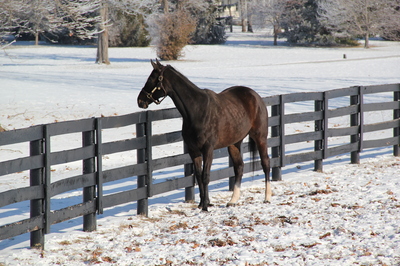
Horse of a Lifetime
It was David who spotted Zenyatta as a yearling at Keeneland, and bought her for such a reasonable price for the Moss', that for one terrible moment he thought he might have made an awful mistake!
"We budgeted way more than she cost, but definitely in the Moss' comfort level. Then when we got her for $60,000, I'm superstitious -I bid 90% of the time from the same spot at Keeneland, and when I saw the two guys walking towards me with the ticket and we got her for $60,000, I thought, 'uh-oh' and I ran to the chute where they horses come out, and she has that big, distinctive white face, and I saw that, breathed a sigh of relief, said,' phew,ok', and signed the ticket.
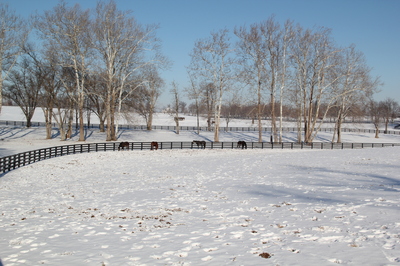
The Early Days
The passion for racing was born within him in 1989, when his father, a jockey's agent, won the Kentucky Derby with his jockey Pat Valenzuela on Sunday Silence, and later took him to watch the Belmont. His mother, Dottie Ingordo-Shirreffs, was Bobby Frankel's business manager, and in his death is executor of his will, so at 14 years old he went to work: first as a hot-walker, then groom, then Barn Foreman, then at age 18 he had a barn of 10 horses for Frankel at Delmar, enjoying a great meet.
At that point, he would have gladly foregone College but at his mother's insistence, he enrolled at UK, and before classes worked at Juddmonte in the mornings, where he says with a wry grin, he filled in the real gaps in his education,
"I enjoyed my time there, but what I needed to learn I learned in the mornings on the farm. I'd never worked on a farm, I never saw a foal. I thought horses were born coming out of the back of airplanes! Every horse we had, was 2, 3, 4 years old and came from Europe, from Juddmonte... so that was the first time I ever saw a foal, and I thought, wow, where do you put the saddle on this, when do we train them?!"
Joking aside though, David stresses that having worked with horses at every stage of their development has stood him in good stead ever since,
"It was good for me because a lot of people I know, education happens at the racetrack, a lot of people I know it happens at the farm, but it's kind of rare that you can get it from birth to when they're weaned to when they're yearlings, to 2 year olds, to when they're broken and trained and ship off to the track, and then bring them back the other way and learn to let them down when they come back to the farm, and getting them in foal, and that whole process.
Most of my success I equate to having worked on the racetrack, having been around the horses, having seen that they come in all shapes and sizes, and seen confirmation faults that really tend to be problems, or just preferences. Toeing out - is that a bad a problem as people at the sales make it out to be? No. Is back at the knee as bad as everyone says it is? Yes, probably. We can walk past the horses that may be the prettiest ones, and go and find the ones with all the tools that are going to enable them to become athletes. With all the good horses we'eve had now we can work our way back, we know what the runners look like, now we have to find them as yearlings, or breed ones like that.
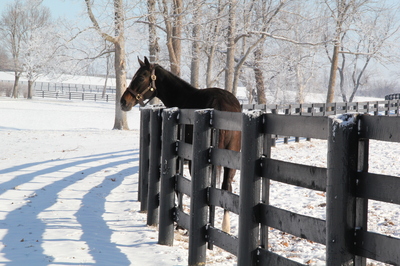
Love at First Sight?
Q: And what about when you first saw Zenyatta?
David: It's one of those things, I can think of maybe five or six horses that when they walk out, we look at them and think we have to have that horse. When she came out, we looked at her and thought she was just perfect for our program: she was big, scopey, good bone, good feet, had all the right angles. She just had this skin disease which wasn't the consignor's fault, and I think between that and her size, people just looked at her and thought she was going to take a little time, a lot of people walked by her.
I think at the end of the day it was meant to be for the Moss' and everyone involved.
The Next Big Thing..?
Q: Do you find now, that Zenyatta influences you when you're looking for other horses, or do you intentionally try and put her out of your mind?
David: I try not to even reference Zenyatta, if I'm interviewing for jobs or anything like that because on the charts of success, she'll probably never be achieved again realistically, she was just that good. However, last year I bought six Grade I winners including Zenyatta, and they come in all shapes and sizes. Switch is not as big and robust a filly, but she's a good size, a little more compact. Mona de Momma is 15.3hh, she won a Grade I. Another one called Crisp who's 17hh, and everybody compared her to Zenyatta physically, she wasn't really but people would say that. Majestic Perfection, he was a typical sprinter build, he won the Vanderbilt.
I try to find each horse that I like. I think we do have a type which is that rangy, scopier horse. I haven't seen another one like her. Her sister is the closest thing I've seen that looks like her and she's by Bernadini, and she's going out to John Sheriffs in the spring, but she's the closest thing I've seen physically to what Zenyatta looks like, which puts a lot of pressure on her! Otherwise I haven't really seen anything that kind of looks like her, they can be big horses but they can be narrow in the middle, or their leg doesn't match their body, or their shoulder doesn't match, something about them. She was a big filly, but everything went together well, she was always very well-balanced. Like I say, she was just a once in a lifetime thing.
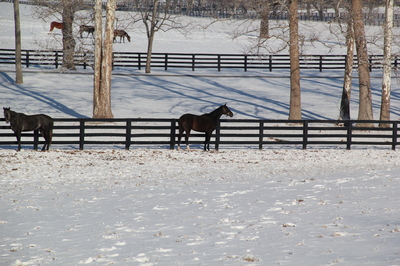
Recognising Greatness
Q: Did she always that amazing presence, that class about her?
David: Well, she did. A lot of good horses have something about them, it's very rare that they'll come out and just be common, but she came out and she had class, when she walked out there was a presence about her. Nothing like she has, that all developed, really when she left the training center and went to John Sherriffs.
I spoke to the girls who run the Training Center on a daily basis, and they called me up and said, "You've either got one really fast horse, or a bunch of really slow ones". I was sitting here in my office, and my phone rings, and Jeanne Mayberry and her daughter April run the Training Center, and Jeanne called up, they had let them all do a little something, a two minute lick for the first time, Jeanne who's trained the Kentucky Oaks winner with her husband, and won a lot of Grade Ones as a trainer, her daughter April was Baffert's assistant, was around Chiluki, and Real Quiet, and Silver Charm, so they know a good horse. Jeanne called up and said,"you'd better get down here". By the tone of her voice I was worried that there might be strangles on the farm, or one of the barns had burnt down, and when she said it was about the black Street Cry filly, I asked if she had EPM, or what? She just told me I had to get down there to see her, that this filly was taking one stride to everyone else's three.
Anyway, I went down there and I watched her go, and it was pretty obvious that she was something special. Just the way she did things from pretty early on in her life. We've had a lot of them down there that we've like a lot early on in their life, and most of them go on to be pretty decent, some of them will break your hearts, so I try not to get too excited, or the owner too excited and set the trainer up for failure, but I did call my mother, and tell her they'd better think of a good name for the Street Cry filly, that's always my thing, because we might be reading about her in the paper.
When she left the farm, we actually thought she could be 2 year old Champion, because at the time she was so much ahead of everyone else. We thought she would win everything, crush them, win the Breeders Cup probably, Juvenile Fillies. She just kept having little setbacks, and she kept growing and growing, and having little setbacks, and growing, little baby things. We ended up being right about her winning the Breeders Cup, it was just as an older mare, and in the Classic.
Q: Did you ever imagine that one horse would inspire so many people, and capture the imagination in the way she has?
David: It's amazing, and at times it's even lost on me. I've been around her so long, which is not to say that I'm unaffected, because there's no-one who's around her who's unaffected, she's just amazing that way, but yes, I'm shocked. It's great, and it proves to me and to the entire racing industry that our business isn't dead at all, it's just poorly marketed in some ways. We could do some things that might help, I mean Zenyatta is so unique, but if she's the ultimate there's still a lot of things that could be done, with let's say Rachel Alexandra and Uncle Mo and Twirling Candy, and all those different horses out there.
Living with Zenyatta
Q: Do you see her every day?
David: Oh yes, I at least drive by and check on her and see her. Sometimes I'm on the 'phone in the morning, and I'll watch her get turned out, and I'll sit and talk on the phone to someone while she runs around before I head back. She's part of the family. What she's done for the business as a whole, for me, for my family, for the Moss' - it's like going to see your sister or something!
Q: She's adjusted so well to a completely different life.
David: Oh, the best, and happy. Happy as a clam, she couldn't be doing any better. Her coat's growing out, she's putting on weight. She goes out, and if there's a mudhole out there she finds it and rolls in it. We have to keep horses up in the stalls at the racetrack because of the facilities we have and the way it's set up, but here she can go out in the field and be a horse. She's got a lot of her good tendencies, personality-wise, they're still a part of her, but there's a part of her that's a horse again too. I see a totally relaxed animal out there that loves it, she's in her element, she has friends that she's hanging out with. She's assimilated beautifully. I've seen a lot of these top race mares coming off the track between here and Juddmonte and wherever, and I've never seen one take to it that easily and really look happy to be there.
Q: What kind of mother do you think she'll be?
David: Well, she's a nurturing animal. Little kids would come up to her at the track and what's the worst thing, that as a hot racehorse that's cranked and ready to run, and on edge? To be around a little kid that's trying to spook it or pet it or something. There was a little girl that walked up and was playing around her legs, and Zenyatta knew it, and was good and didn't do anything. Another time, a little girl came up behind her and swiped her butt really fast, and normally that would get you kicked from here to Fayette County, and Zenyatta just looked at her, she's an extraordinary horse.
David will now divide his time between the farm where breeding is about to start, the West Coast, racing and sales down in Florida, and racing on the tv in his office. When he first started, his goal was to buy ten Grade One winners, which he's done already, (Zenyatta won thirteen on her own), and the tally for this year already at the time of press was two that were bought at auction, broken & trained by his team. Hardworking and driven, he acknowledges he makes sacrifices but, "I woudn't trade it for anything. I have too good a gig, too good a clientele, too much opportunity and I'm too fortunate. Like I said, I wouldn't change a thing for the world, it's great. I like it. " Thank you to David Ingordo for his time, to Lane's End Farm, and of course to Zenyatta, and thank you for reading.
